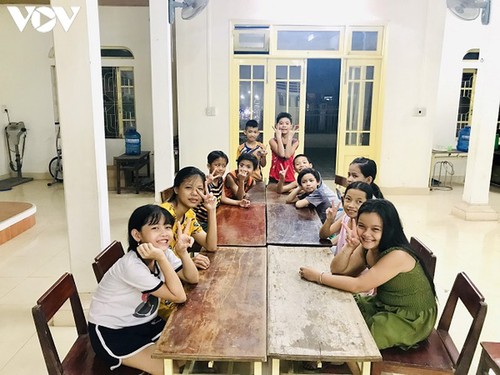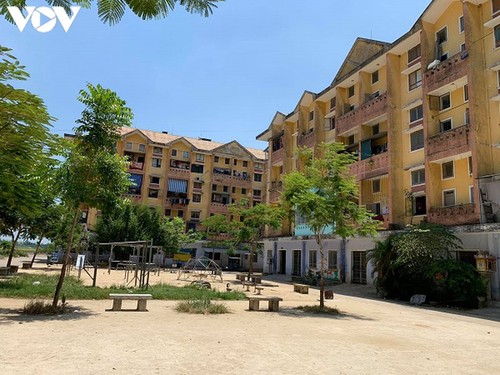
Hanh’s free illiteracy eradication class in Kim Long resettlement area
|
In a small house in the Kim Long resettlement area of Hue city, Bach Thi Ngoc Hanh recalls teaching literacy to fishermen’s children during Vietnam’s hardest years.
Hanh’s family used to live in Ben Me village. She completed high school after the nation was reunified in 1975. At that time, Ben Me was a poor fishing village. Nobody paid attention to the children's education. They were all illiterate.
Hanh opened an illiteracy eradication class for the Ben Me children. Every night she taught them reading, writing, and singing. Her class soon drew all the village children.
In 1995, the Hue administration moved the Ben Me villagers to a resettlement area in Kim Long ward and adopted a policy to encourage the children to go to school.
But many of them still dropped out, because they were past the school age and unable to keep up with the education program.
So Hanh kept offering her free class. She says this made her own life more meaningful.
Hanh recalled, “The village children were pitiful. Their parents loved and took pity on them, but couldn’t afford to pay for their education. What I could do was to spend 2 or 3 hours each evening to help the children.”
 The resettlement area in Huong So ward, Hue city The resettlement area in Huong So ward, Hue city |
Ten years ago, about 1,000 households in Phu Binh and Vy Da ward were resettled in Huong So ward, Hue city, and Phu Mau commune, Phu Vang district. Since then all the children have gone to school.
Nguyen Tri, who lives in the Huong So resettlement area, said, “Living conditions in the resettlement area are beter. In the past we had to take our children to work. That’s why they couldn’t attend school. If any household in the area can’t afford the school fees, the ward People’s Committee provides books and clothes to encourage the children not to quit school.”
Earning a living ashore is a huge challenge for fishermen because most of them are illiterate, making it extremely hard to find a job. When, due to economic difficulties, the State couldn’t subsidize the fishersmen, most of them left the resettlement area to return to their boats.
Van Huu Cam, a revolutionary veteran living in Hue city, said, “Generally, children from fishing families don’t do well in school. In that case, good students are assigned to help them. Some teachers have even volunteered to tutor the children for free. As a result, their studies have gradually improved.”
Thanks to the government, the fishermen’s lives have improved. All of them have jobs. Many have become drivers, food service workers, or small businessmen. Their children can now go to school.
Mai Van Thanh in Huong So ward, Hue city said, “We have been resettled here for a decade and live in easier circumstances than in the past. Many fishermen have been able to build a house and buy a motorbike. Once only 40% of the children of fishermen attended school. The rate now is between 90 and 95%.”